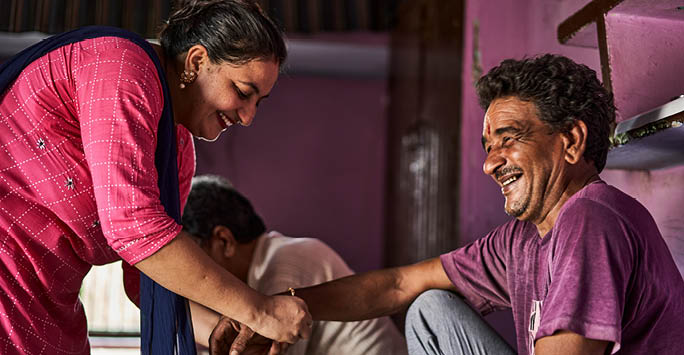
Later-life care in India is mostly the responsibility of adult sons and their spouses. Although legally daughters are also obligated to look after their older parents, nonetheless, culturally the expectation is from the son and his spouse. This trend is now changing, and daughters are now increasingly providing later-life care to their older parents.
Investigating this trend, I conducted a study among older parents with two or more daughters to understand how caregiving arrangements are mapped and how filial expectations have shifted from adult sons to adult daughters.
As per the Hindu Succession Amendment Act (2005) daughters have a right to inherit ancestral property in India and her marital status will not have any bearing regarding her inheritance rights. Hence, women have become much more aware of their own rights and often daughters are given a share of inheritance based on their promise to provide later-life care.
Adult daughters as primary caregivers
The findings of the study revealed that most of the older parent/s chose to relocate and buy a house or an apartment near one of their daughter’s households. Interestingly several of the older respondents chose to invest in property close to their daughter’s neighborhoods as they believed that their daughters would look after them. All the older respondents were financially independent, however, they felt much more secure and reassured while staying close to their daughter. The other important factor for relocating were health issues faced by the older parents and who were not sure if they would be able to look after themselves.
The majority of the older adults highlighted that they believe that daughters are better caregivers than sons as they manage to look after their in-laws and their own parents. On the other hand, these older adults pointed out that they were aware of many cases, also constantly being highlighted by the media, wherein the sons and daughters-in-law had become abusive and were not too happy with the later-life care responsibility of their in-laws. Most of the older respondents who were interviewed for this study have been living near their daughters for the last five to seven years. Attributing much credit to their sons-in-law, the older respondents admitted that their harmonious relationship with their daughters could persist because of their close bond with their sons-in-law as well.
With respect to their relationship with the other daughter the older adults pointed out that their other daughter provided emotional support through phones and video calls and visited them at least twice a year to check upon them. Stating their disappointment over not having sons initially, these older adults acknowledged that they were lucky to have such daughters who took such good care of them.
Voluntary Contributions by Adult Daughters and Family
Interviews with the primary caregiver daughter indicated that they did not perceive caregiving as a burden. Most of the caregiver daughters were elder daughters and they considered later-life caregiving of older parents as their duty. Although at times they did find it difficult to manage between their work, own household and their parental responsibilities, nonetheless, these adult daughters believed that by looking after their older parents they are fulfilling their moral duty of providing later-life care to one’s older parents. Despite shouldering most of the caregiving roles, these adult daughters did not charge their other sibling of being burden-free as they believed that having their parents near them acted as a source of emotional support for them as well.
Changing Later-Life Caregiving Roles in India
This study highlights the change in caregiving patterns from adult sons to adult daughters. Additionally, this study also illustrates that the bond between adult daughters and their older parents is quite strong, and daughters are happy to provide later-life care to their ageing parents. Through these findings this study intends to make a cultural impact as son-preference continues to dominate the Indian family system.
Culturally this is a major shift in caregiving patterns as later-life caregiving in India as adult male children and their spouses are expected to look after their older parents. As the evidence from the study suggests that older parents are now changing their filial expectations and relying on their adult daughters for later-life physical and emotional care. This shift is also significant as it shows that traditional gender roles are changing, and older parents are now giving equal preference to their adult male and female children. Demographically, this trend is significant as parents are now perceiving their daughters as caregivers and relying on their daughters and making changes in their living arrangements to remain close to their daughters in their later-lives.
About the author
Dr Jagriti Gangopadhyay is currently an Assistant Professor and the faculty coordinator for the Center for Women’s Studies, at the Manipal Centre for Humanities, Manipal Academy of Higher Education (MAHE). Recently, she was also awarded the Shastri Publication Grant by Shastri Indo Canadian Institute for her monograph titled: Culture, Context, and Ageing of Older Indians: Narratives from India and Beyond, published by Springer. She has also co-edited the book, Eldercare Issues in China and India published by Routledge in 2022. Additionally, she co-edited a symposium on Public Health and Qualitative Insights from India with the journal Society. This year she has also been appointed as an Associate at the Centre for Care, which is a collaboration between the Universities of Sheffield, Birmingham, Kent and Oxford, the London School of Hygiene & Tropical Medicine, the Office for National Statistics, and three charity organisations: Carers UK, the National Children's Bureau, and the Social Care Institute for Excellence.